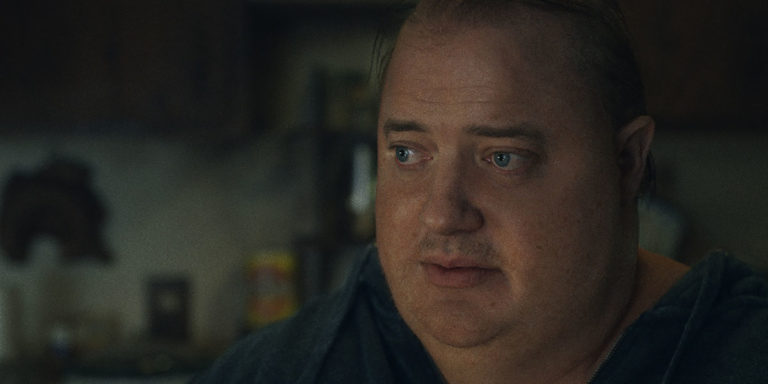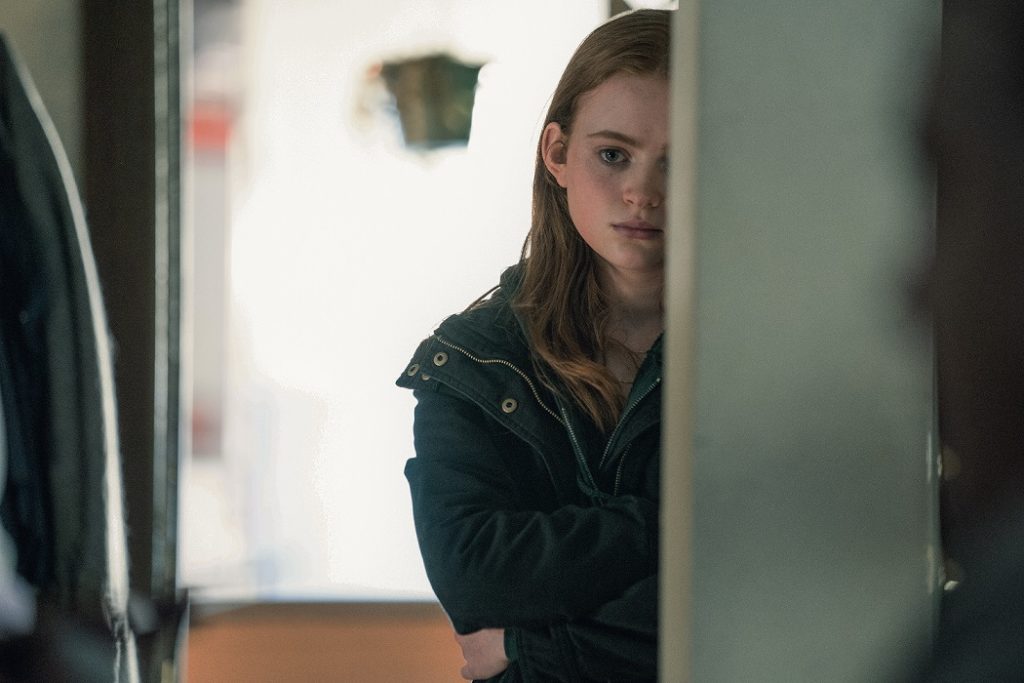
Society doesn’t tend to look kindly on those who are overweight, firstly by setting unrealistic standards for what being fit and attractive mean. People can be cruel and careless in how they treat others who, for whatever reason, are heavy, making comments under their breath or physically reacting to the sight or smell of somewhere large. Darren Aronofsky’s The Whale is a stirring portrait of a man who has shut himself off from much of the world due to his weight, surrendered to the fact that there is nothing he can do to get in shape or return to a healthy lifestyle.
Charlie (Brendan Fraser) teaches students online, keeping his webcam off under the guise of it being broken to hide the fact that he weighs 600 pounds. Alone after the death of his partner, Charlie is visited often by his good friend, Liz (Hong Chau), a nurse who urges him to go to the hospital after taking a very worrisome blood pressure reading. As an eager young missionary, Thomas (Ty Simpkins), comes by, thinking Charlie could use his help, Charlie begins to take stock of how close he might be to congestive heart failure, prompting him to reach out to his teenage daughter, Ellie (Sadie Sink), to attempt to connect with her.
This film’s title is surely meant to invoke the brutal terminology some use for those who are extremely obese, but it also serves as a reference to Charlie’s favorite book, Moby Dick. Charlie has a deep passion for writing and specifically for appreciating good writing, reciting passages from that book and favorite essays as a way to calm himself down when he needs to catch his breath, something that happens often.
Throughout the film, he encourages his students to be honest rather than writing what they think he wants them to, and he employs the same approach with Ellie when he asks her to write something just for him while he thanklessly revises the essays that have earned her a failing grade in school.

The Whale is not just Charlie’s story. Liz’s connection with him and her own mourning for something she has lost are felt as she reminds Charlie that him dying will affect her too. Ellie is angry not just at the father who left when she was eight to be with a male student but at the world, and she doesn’t want anyone to analyze her. Thomas is also on a journey, one that seems rooted in being able to help people accept Jesus because he genuinely believes that will help to heal them. These four stories are magnificently interwoven in author Samuel D.
Hunter’s adaptation of his own play, meticulously and intimately directed by the talented Aronofsky.
This film features an absolutely remarkable cast, calling upon Chau and Samantha Morton, who plays Ellie’s mother, for dependable film-enhancing support. Simpkins brings a starry-eyes energy to Thomas, clearly committed to what he is saying and not trying to fill some conversion quota. Sink, already a standout from the most recent season of Stranger Things, surpasses all expectations with a transformative turn as someone full of rage who unleashes it fervently and viciously at every turn. And then there’s Fraser, an underappreciated actor who does so much more than just sink into the layers of skin in his physical performance. He makes Charlie a kindhearted, gentle person who has accepted his current state and created a system that enables him to function as best as possible within it.
This is an intimate and human film, one that highlights Charlie’s loneliness but also his insular nature, leaving a twenty-dollar bill in the mailbox for the pizza guy who comes every night so he doesn’t have to be seen. A number of stage directions from Hunter’s play seem intact, with characters pausing emphatically as they are about to leave the apartment that serves as the sole setting for the film, but the dialogue is so sharp and rich that it doesn’t feel unnatural. Aronofsky delicately and purposefully follows his characters as they move around a place that feels equally like a shelter and a prison. It’s a keenly focused and stirring drama deserving of the many accolades it will undoubtedly collect.
Grade: A-
Check out more of Abe Friedtanzer’s articles.
Following its North American premiere at the Toronto International Film Festival, The Whale will be released in theaters on December 9th.

